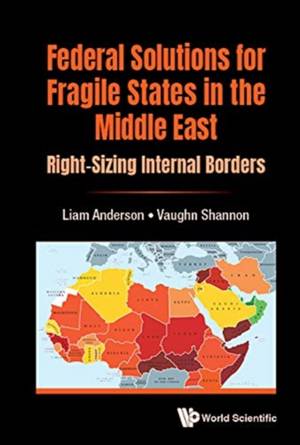
Door een staking bij bpost kan je online bestelling op dit moment iets langer onderweg zijn dan voorzien. Dringend iets nodig? Onze winkels ontvangen jou met open armen!
- Afhalen na 1 uur in een winkel met voorraad
- Gratis thuislevering in België vanaf € 30
- Ruim aanbod met 7 miljoen producten
Door een staking bij bpost kan je online bestelling op dit moment iets langer onderweg zijn dan voorzien. Dringend iets nodig? Onze winkels ontvangen jou met open armen!
- Afhalen na 1 uur in een winkel met voorraad
- Gratis thuislevering in België vanaf € 30
- Ruim aanbod met 7 miljoen producten
Zoeken
Federal Solutions for Fragile States in the Middle East: Right-Sizing Internal Borders
Liam Anderson, Vaughn Shannon
Hardcover | Engels
€ 210,95
+ 421 punten
Omschrijving
In most regions of the world, federalism (territorial autonomy) is used as a successful institutional means of dispersing political power and accommodating ethnic, religious, and cultural diversity. The Middle East is an exception. Aside from the anomalous case of the U.A.E and Iraq's troubled experiment with federalism, Middle Eastern regimes have largely resisted efforts to decentralize political power. As a result, the norm in the region has been highly centralized, unitary systems that have, more often than not, paved the way for authoritarian rule or played witness to serious internal fragmentation and conflict divided along ethnic or religious lines.Federal Solutions for Fragile States in the Middle East makes an argument for the implementation of federalism in the post-conflict states of the Middle East. The argument operates on two levels: the theoretical and the practical. The theoretical case for federalism is backed by empirical evidence, but to accurately evaluate the practical and logistical feasibility of its implementation in any given case requires detailed knowledge of 'real world' political realities. The book's focus is on four post-conflict states -- Iraq, Syria, Yemen, and Libya -- though the arguments advanced within have broad regional applicability.
Specificaties
Betrokkenen
- Auteur(s):
- Uitgeverij:
Inhoud
- Aantal bladzijden:
- 344
- Taal:
- Engels
Eigenschappen
- Productcode (EAN):
- 9781800610040
- Verschijningsdatum:
- 14/06/2021
- Uitvoering:
- Hardcover
- Formaat:
- Genaaid
- Afmetingen:
- 152 mm x 229 mm
- Gewicht:
- 625 g

Alleen bij Standaard Boekhandel
+ 421 punten op je klantenkaart van Standaard Boekhandel
Beoordelingen
We publiceren alleen reviews die voldoen aan de voorwaarden voor reviews. Bekijk onze voorwaarden voor reviews.











